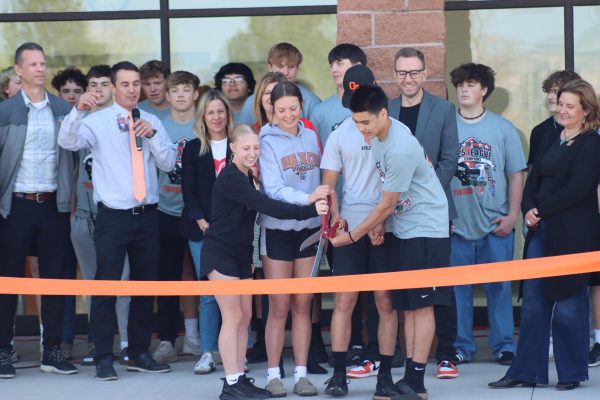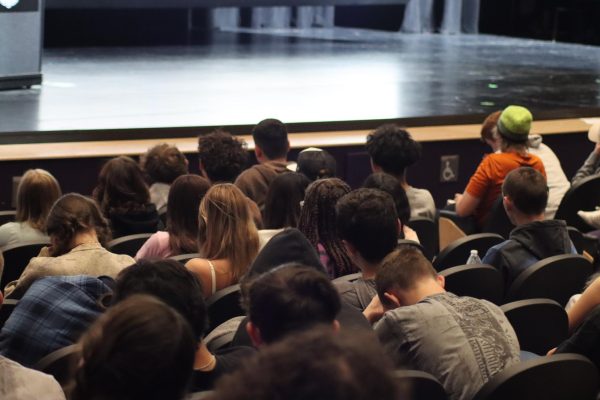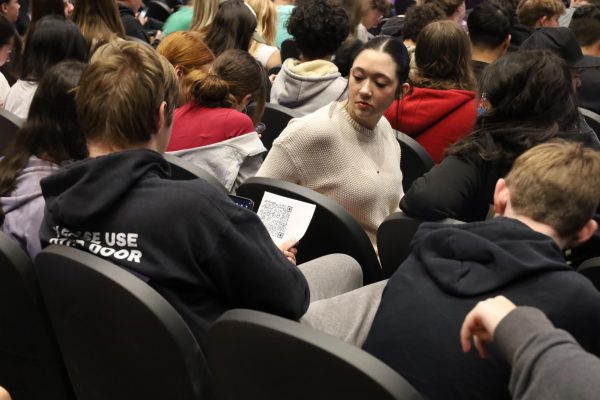Sexual assault controversy circulates around D51
Editor’s Note: The Orange & Black has chosen not to name the accused or report on the allegations of sexual assault as no formal charges have been filed and the newspaper has not investigated the underlying claims.
Over the past few weeks there has been a significant amount of controversy surrounding accusations of sexual assault against a Fruita Monument High School basketball player, shirts Grand Junction High School students wore in response during a game, and the circulation of an online petition.
Sexual assault is a sensitive topic amongst all groups of people. When GJ students saw an opportunity to bring to light these accusations and the issue of sexual assault, they took that chance.
“I don’t believe that there is any place for sexual assault in our school or our world. It is not acceptable and we need to keep people accountable,” said FMHS junior Hailey St. Martin.
At the Junction vs. Fruita basketball game at GJHS on Jan. 18, several students wore shirts with messages: “No means no” and “Tigers ask for consent;” as well as one reading “F-word Fruita.”
Members of the GJHS student section also chanted “no means no” directed at the FMHS player at the center of the allegations. During halftime at the game, some students were asked by GJHS dean of students Tom LeFebre to cover up their shirts and cease chants.
“CHSAA has rules against the crowd directly targeting an opposing player during a game,” said GJHS principal Meghan Roenicke.
Following the game, pictures of the students and their shirts circulated all over social media, making many more people aware of the situation. The following week, a group of four GJHS students were suspended from attending basketball games for the remainder of the season.
“The boys were punished for their refusal to follow reasonable requests and cover up the shirts,” said LeFebre.
Despite the fact that these students were eventually punished by the school for their actions, many students all over the valley are proud of what they did: standing up against violence against women.
“They had a right to do it because the adults weren’t doing anything, so the student body had to stand together and do something,” said GJHS sophmore Ashlee Cramer.
Sexual assault is a crime that carries with it an immense amount of emotional trauma for the victim and is never acceptable.
“There should be more support and people should not look down on victims,” said Cramer, “for there to be change we have to stand together and be on her side.”
In the week following this game, a petition circulated online, eventually gaining more than 900 signatures before being taken down. This petition was made by a private creator on change.org. Its goal was to get the FMHS student, who is at the center of this controversy, removed from the school basketball team.
In response, the principal at Fruita Monument, Todd McClasky, made various comments on this petition. He stated that the allegations are unfounded and that any students seen interacting with it would face disciplinary actions by the school.
Following an email request for an interview, McClaskey wrote back, “We have provided students with information on how they can properly report an issue or concern,” and supplied a list of resources he suggests, such as Safe2Tell and school counselors. However, he chose not to comment directly on the specific allegations or on the reasoning for his stance pertaining to the non-school petition.
Relating to this petition, the First Amendment to the U.S. Constitution states: “Congress shall make no law respecting an establishment of religion, or prohibiting the free exercise thereof; or abridging the freedom of speech, or of the press; or the right of the people peaceably to assemble, and to petition the Government for a redress of grievances.”
In the 1969 U.S. Supreme Court case of Tinker v. Des Moines Independent Community School District, the court ruled that “school officials cannot censor student expression unless they can reasonably forecast that the expression will cause a substantial disruption of school activities or will invade the rights of others.”
On Feb. 15, during the Fruita vs Central basketball game, similar actions were taken by CHS students using shirts and chants directed towards the same player.
Students have the constitutional right to protest and have their own opinions. The accused also have rights, however. The 14th Amendment guarantees that a person who is accused of a crime still has the right to due process. This means that they are innocent until proven guilty by law and the school district must also protect them until that point.
Despite this, public opinion is powerful.
“The court of public opinion can easily ruin someone’s life. I have attended seven or eight funerals of students who have committed suicide in my time at Junction,” said Roenicke.
When asked about the issue and how schools handle the topic of sexual assault, Roenicke said, “Every student should have at least one trusted adult in the building.”
Her goal is to ensure that all school students are safe. School employees have a responsibility to report assaults that are brought to them, but a full police investigation will only be launched if it is what the victim and their family wants. If this route is chosen, once it is brought to the police, the investigation is out of the school’s hands. If requested by the victim, a school does have a responsibility to keep the accused away from the victim when on school grounds.
Roenicke also said that no formal allegations have been reported to the school or law enforcement. This somewhat ties the hands of the district.
According to the National Crime Victimization Survey, only approximately 310 out of every 1,000 sexual assaults are reported, and only about 25 out of those 1,000 will be incarcerated.
Sexual assault continues to be an important issue in the world. Administrators and students all over D51 agree that if someone experiences an assault, they have a right to be protected and to bring their issue to a trusted adult.
Your donation will support the student journalists of Grand Junction High School. Your contribution will allow us to purchase equipment and cover our annual website hosting costs.






Lincoln McQuade • Sep 30, 2022 at 10:42 am
Absolutely not. The student who did that unforgivable action should be investigated, held accountable, and mentioned, then transferred to the worst school in the state. He was the one who chose to do what he did, he’s the one who’s going to face consequences. If he’s found guilty and none of those mentioned things happens, then it’s not just him who’s incompetent.
Holly Eisenhower • Feb 19, 2022 at 1:44 am
I agree with the student body, If the adults won’t do anything to protect OUR STUDENTS then there classmates will be the ones to stand up for them. I think it’s ridiculous that people got suspended from attending basketball games for raising awareness. But do your thing it will all come back to you eventually.
Zane Ebel • Feb 18, 2022 at 10:52 pm
I believe you represented to issue faced by the school district taking action properly. As we have always stood by the ideal of “innocent until proven guilty” in our courts, I believe that this should also be respected by the district and students. While there is a high chance that the student did commit the sexual assault, it has not been proven in the justice system and it is therefore unlawful to punish the student. It was right for him to continue playing in these games. Hopefully it can all be officially resolved and this controversy can end. Also much respect to Me. Mclasky and Hailey. They both had good comments and it was valuable to see the opinion of a student more free to speak their mind and an administrator who properly abided by rules and did their best to minimize conflict.